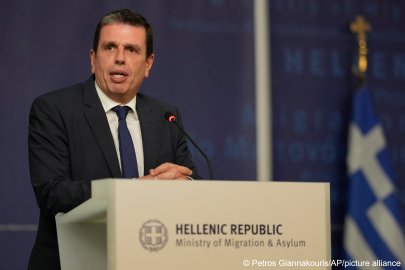
Greece looks set to close the HELIOS integration program, just as the EU has pledged more than 40 million euros towards programs to protect unaccompanied migrant children and to boost electronic surveillance at the bloc’s external borders.
The future of Greece’s Hellenic Integration Support for Beneficiaries of International Protection (HELIOS) program for recognized refugees is in doubt, as it remains unclear whether funding exists to continue the program beyond the end of November.
HELIOS, which is run by the International Organization on Migration (IOM), provides housing, employment and language learning support for people who have been granted protection in Greece. It was initially funded by the EU (from June 2019 to December 2021) until funding was taken over by the Greek Ministry of Migration and Asylum in January 2022.
According to the project description, HELIOS aims to support the integration of refugees in Greek society and assist them towards independent living. However, limited resources and strict criteria have made it difficult for many to benefit from the program. For example, in order to qualify, aside from having a positive asylum request, you must also be in possession of an existing housing contract for six-months. These are conditions most refugees are unable to meet.
The program was designed to follow on from the state support refugees receive after obtaining asylum, which has since been reduced from six months to one month. These changes have effectively prevented transition, with the only people able to benefit being those who were still eligible for the previous six-month state program, or those with financial means.
Also read: Migration policy: Greece to lead ICMPD in 2024
Continuation of HELIOS subject to funding
According to a HELIOS representative, the Greek government took over funding of the project with the aim that it would later be financed in the context of the European Social Fund Plus (ESF+) multi-annual funding framework dedicated to improving social cohesion and economic well-being post-pandemic.
It remains unclear whether funding for the project is available. The HELIOS website states that the “provision of the services of the project and the continuation of its implementation are subject to funding availability and continuation”.
Speaking to InfoMigrants, the representative of the HELIOS project stated that the current agreement with the donor “foresees the extension of the project until 30 November 2023”. The representative added that all possible efforts of IOM in coordination with the Ministry of Migration and Asylum are devoted to “ensuring funding for the prompt continuation of the service provision to the project beneficiaries”.
The representative claimed that the closure of the current project cycle is expected to mark “the initiation of a new one, expectantly with no gaps between the two funding mechanisms”.
However, the closure of previous programs, such as ESTIA — a housing program for vulnerable refugees — did not lead to the emergence of a replacement program, instead leaving highly vulnerable people without the necessary support.
According to the HELIOS representative, the discussions with the competent authorities to this end “are currently ongoing” while they try to find the best solutions for both future and existing beneficiaries of project support services, in order to fulfil their entitlements within the new project under the ESF+ funding”.
Also read: Asylum seekers bear the brunt of the Greek housing shortage
EU funding for further migration programs
While HELIOS may be coming to an end, the European Union has pledged funding for two new programs relating to migration. Greece will receive an additional 42.2 million euros in funding from the EU for increased protection of unaccompanied minors in Greece, and for electronic surveillance at the country’s borders by the police.
Through the ‘Pyxida’ program, the Greek Migration Ministry wants to open five national centers providing specialized mental health services, training and clinical supervision for professionals, legal assistance, services to improve high school retention rates and services for unaccompanied minors who have reached the ages of 18-21 and are not under a protection plan. This program will be included in the Asylum, Migration, and Integration Fund (2021-2027), with 90% co-funding by the European Union.
The second proposal focuses on the electronic surveillance of land borders by the Greek police. The EU funding will cover the cost of 27 new mobile centers for “incident management” for land border patrols and increased surveillance of less accessible areas.
The majority of units (20) will be installed in all-wheel drive vans, while the remaining seven will be installed in transferable containers that can be be moved to operational border areas as necessary.
This program is part of the EU’s Border Management and Visa Instrument, which aims to ensure “strong and effective European integrated border management” at the bloc’s external borders, with 80% co-funding by the European Union.
Also read: Greek migration ministry to partner with NGO to combat human trafficking
With AMNA






